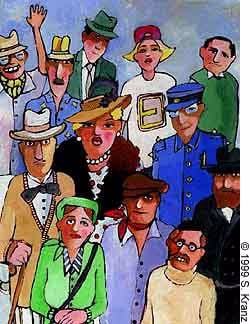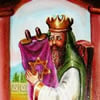A US president has four years between elections, a congressman needs to renew his mandate every two years, while dictators stay in office for as long as they can keep their generals happy (or terrified). But G‑d is up for reelection every year.
Every Rosh Hashanah, we crown G‑d king. According to the Kabbalists, without this annual coronation (effected by our resolve to submit to the divine sovereignty, our recitation of the "verses of kingship" included in the special prayers of the day, and our sounding of the shofar), G‑d's "kingship" would not be renewed, and the whole of creation - which derives from the divine desire to be king - would cease to exist.
(We don't usually think of kings requiring election to their office, but that's because the word "king" is a rather imprecise translation of the Hebrew word melech. A melech, by definition, is a sovereign whose kingship derives from a people's freely chosen desire to submit to his rule. A king who reigns by force or exploitation is not a melech but merely a moshel or "ruler".)
How does G‑d prepare for His annual reelection? Does He just sit up there in His "palace" trusting in our good sense to proclaim Him king once again? Does He go after the vote, mingling with the masses, pressing the flesh, kissing babies? Here's how Chassidic master Rebbe Schneur Zalman of Liadi (1745-1812), describes the month of Elul - the month that precedes the divine coronation on Rosh Hashanah:
It is like a king who, before he enters the city, the people of the city go out to greet him in the field. There, everyone who so desires is permitted to meet him; he receives them all with a cheerful countenance and shows a smiling face to them all. And when he goes to the city, they follow him there. Later, however, after he enters his royal palace, none can enter into his presence except by appointment, and only special people and select individuals. So, too, by analogy, the month of Elul is when we meet G‑d in the field... (Likkutei Torah, Re'ei 32b; see also Likkutei Sichot, vol II p. 632 ff.)
While this description bears some resemblance to a politician running for office in a modern democracy, there are, of course, some significant differences. Such as the fact that a campaign promise by G‑d is far more likely to be fulfilled than one that is made by your typical office-seeker.
This week we enter the month of Elul. The king is in the field; if you need something from Him, now's the time to ask.







Join the Discussion